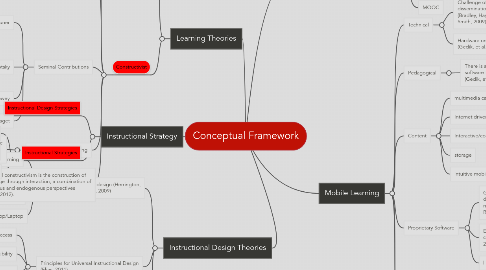
1. Instructional Design Theories
1.1. Principles for mobile design (Herrington, Herrington & Mantei, 2009)
1.1.1. Personalized Learning
1.1.2. Collaborative Learning
1.1.3. Inclusion of Consumption and Production
1.1.4. Flexibility in Device Mobile to Desktop/Laptop
1.2. Principles for Universal Instructional Design (Elias, 2011)
1.2.1. Equitable Access
1.2.2. End user flexibility
1.2.3. Consideration for disabilities
1.2.4. Communication and Collaboration are essential components
1.3. Flexible, student-centered and transparent (Khirwadkar, 2009)
1.3.1. Due to the flexibility of mobile instructional design, a designer is required to make additional decisions that will affect design (Jonassen, 2012).
2. Learning Theories
2.1. Social Learning Theory
2.1.1. Connectivism (Siemens)
2.1.1.1. Community
2.1.2. Constructivism related to social learning (Vygotsky)
2.1.3. Communication & Feedback
2.2. Constructivist
2.2.1. Exogenous constructivism posits that knowledge is acquired through experiences related to the outside world from within a specific domain (Schunk, 2012).
2.2.2. Endogenous constructivism proposes that knowledge is abstractly constructed from prior knowledge instead of from environmental interactions (Schunk, 2012).
2.2.3. Seminal Contributions
2.2.3.1. Bruner
2.2.3.1.1. classification and categorization into cognitive maps (Bruner, 1960)
2.2.3.1.2. Discovery- and Inquiry-based learning
2.2.3.2. Vygotsky
2.2.3.2.1. Social Environment - socially mediated learning (Schunk, 2012)
2.2.3.2.2. ZPD, self regulation, scaffolding
2.2.3.3. Dewey
2.2.3.3.1. Active and Experiential Education
2.2.3.4. Piaget
2.2.3.4.1. Interaction with Environment results in knowledge gain
2.2.4. Self-Regulated Laearning
2.2.4.1. The empowerment for each learner to make choices about how and what they will learn (Karagiorgi & Symeou, 2005)
2.2.5. Dialectical constructivism is the construction of knowledge through interaction, a combination of exogenous and endogenous perspectives (Schunk, 2012).
3. Instructional Strategy
3.1. Instructional Design Strategies
3.1.1. The constructivist approach to design involves overarching concepts, authentic assessments and Socratic feedback (Schunk, 2012).
3.2. Instructional Strategies
3.2.1. Nine Events of Instruction (Gagne)
3.2.2. First Principles of Instruction (Merrill)
3.2.3. Collaboration (Peng, et al., 2009)
4. Mobile Learning
4.1. Technical
4.1.1. Challenge of designing learning for dissemination on multiple devices (Bradley, Haynes, Cook, Boyle & Smith, 2009)
4.1.2. Hardware unfortunately drives the design (Gedik, et al., 2012)
4.2. Pedagogical
4.2.1. There is a need for pedagogically sound software that allows for instructional strategies (Gedik, et al., 2012; Peng, et al., 2009)
4.3. Content
4.3.1. multimedia capabilities
4.3.2. Internet driven
4.3.3. Interactive/collaborative
4.3.4. storage
4.3.5. intuitive mobile interface
4.4. Proprietary Software
4.4.1. Given that there are numerous devices available, the development of device-specific software is necessary to maximize the potential of the device (Nedungadi & Raman, 2012).
4.4.2. Essential to learn about the ID elements of the comprehensive system (Koszalka & Ntloedibe-Kuswani, 2010)
4.4.3. limitations of design software
4.5. Design and Development Research
4.5.1. Formulate conclusions - based on data- derived from practice (Richey & Klein, 2007)
4.5.2. Lack of effective design and development research (Peng, Su, Chou, & Tsai, 2009)
4.5.3. Design and development research is necessary given mobile device capabilities (Dyson, Litchfield, Lawrence, Raban & Leijdekkers, 2009)
4.6. Exploratory Phase
4.6.1. Very few studies focus on instructional design practices of mobile learning (Elias, 2011)
5. Open Educational Resources
5.1. Ubiquitous Learning
5.1.1. anytime anywhere access to education
